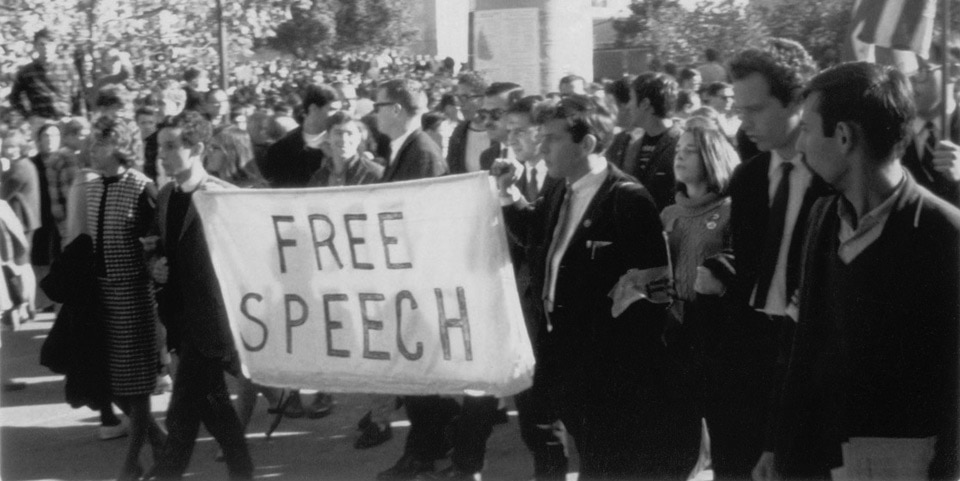
Student demonstrators during the free speech movement at the University of California Berkeley in 1964. Photo: Bob Johnson//Berkeley FSM Archives
By Jimmy Quinn
Ok. Maybe the marketplace metaphor for free expression is not the most apt. Ideas have an intrinsic value, and a person does not barter and exchange them the way that he would a used car.
Yet, a competition of ideas is the only effective way to separate good ideas from the rest without limiting the ability to think and reason critically. When we talk about creating a productive competition of ideas we hope that the better ones will end up on top because “consumers” voted with their feet.
This might not always be the case, as professional provocateurs and trolls attempt to sow anger and division wherever they go. With cameras pointed at them, it can feel as though their ideas are gaining traction (even if people just like gawking at a revolting freak show sometimes).
So one argument goes, Milo creates an unsafe environment for certain individuals when he comes to campus. How he preaches to the choir and targets audience members reveals his speeches to be pep rallies for those of the Pepe persuasion rather than good faith attempts at engaging in an exchange of ideas. He isn’t a productive participant in university debates, but instead a dangerous charlatan who doesn’t deserve a platform. And campus conservatives who invite individuals like him (and by implication, those who defend their prerogative to invite them) must “reconcile their passion for free speech with the idea that some student groups are apparently not worthy of hearing conservative ideas without being directly threatened or insulted.”
Putting aside the issue that Milo’s far-right nihilism is a far cry from conservative American ideas and that he’s a sui generis basketcase of empty self-aggrandizement, this argument plays into the wingnut agenda—without anything true to say, they tour university campuses, trafficking in conspiracies, lies, and insults and profit from the histrionics of their critics’ attempts to silence them.
Harassment and the incitement to violence is one thing. These limits are proscribed by the law and university codes of conduct. However, calling for a solution to offensive, crude, and insulting speech asks the university community to set a new limit on the substance of opinions that may be expressed on campus, as well as the style in which they may be argued. I’m skeptical that this new limit (hidden in the euphemism of protecting substantive freedom), even “collaboratively” implemented, will promote a beneficial exchange of ideas that protects pluralism on university campuses.
Couching a “collaborative model” of free speech in terms of “formal” versus “substantive” freedom doesn’t change a thing: When an individual’s supposed “substantive” freedom of speech (which seems to be based on claims about a person’s emotional state) imposes on another’s ability to express himself, this is a limitation of expression that has the same effect of rejecting certain unsavory viewpoints, and their sometimes repulsive champions, from the public square.
An approach to protecting marginalized students’ substantive freedoms in campus debates effectively exists at some universities in the United States, where student governing boards have revoked funding for student organizations that invite speakers to express offensive opinions—and too often these days, the newspapers that give transgressors a platform.
Why care about the ability of [what hyperbole-prone students call] fascists and Nazis to express themselves, though? Sensitivity to the point of viewpoint discrimination, no matter how obscene some opinions are, does not only silence right wing speakers; plenty of left wing invitees have been pressured to retreat from university speaking gigs. Joe Biden, Linda Sarsour, and Cecile Richards have all faced disinvitation campaigns in recent years. This obstacle to discussion touches everyone.
The marketplace model holds formal limits on speech as the most legitimate because they allow for the widest range of expression without interference from people who possess a clear interest in limiting competition for their political ends. It acknowledges that individuals caught up in the heat of a debate don’t make fair decisions, and it vests power in the least restrictive, most objective set of rules possible, protecting the power of the pulpit from monopoly by an intolerant majority (or a vocal minority).
“Compromise” sounds pleasing to the ear, but in practice it gives way to soft censorship by those on campus who already have influence.
Such compromise, though, isn’t only misguided, but it’s also impossible. Debates occur through many mediums, of which talks and discussions are only one category. Ensuring a public discourse that promotes social good doesn’t only require trust in face-to-face conversations—it sometimes necessitates that participants organize themselves in knock-down, drag-out fights that test the bounds of civility, without breaking the rules and prohibiting the other side from rebutting their claims.
When far-right activist Mike Cernovich spoke at Columbia University’s campus last year, students in the audience held signs attacking his outlandish claims, while a group protested his presence outside. The atmosphere was decidedly uncivil, yet the alt right’s opponents made their argument without foreclosing on the freedom of expression.
Don’t get me wrong. Civility and mutual respect are crucial components of ensuring productive discussion, especially in the university environment. But the competition of ideas model acknowledges that important debates aren’t merely had by civil discussion, but also at demonstrations, on social media, and through several other mediums where tensions could be fraught.
For all its faults, the marketplace conception of free expression notes the imperfection of human nature and strives to create the most level playing field possible for individuals of all perspectives to set up shop. While there might be a degree of “consumer discrimination” in the status quo, the solution to it cannot be found in a top-down approach that effectively restricts certain forms of speech. Intellectual life dies when the alternatives to prevailing ideas and their expression fail to offend us, not when they succeed in shocking.
Instead, we should reflect upon how we can reinvigorate a meaningful exchange of ideas that marginalizes the influence of trolls, without forcibly excluding them from our intellectual spaces. This begins with the individual, by shunning groupthink and reflexive identity politics and reconsidering how we participate in debates.
After all, why overthrow the current way of doing things when we can improve it?
Other posts that may interest you:
- The Trouble with ‘Ecocide’
- Carbon dioxide removal – hit or miss?
- Local Victories for Turkish Opposition — A Sign of Hope?
- Are France and Japan a Mismatch Made in Heaven?
- A Reflection on Dark Tourism
Discover more from The Sundial Press
Subscribe to get the latest posts sent to your email.





